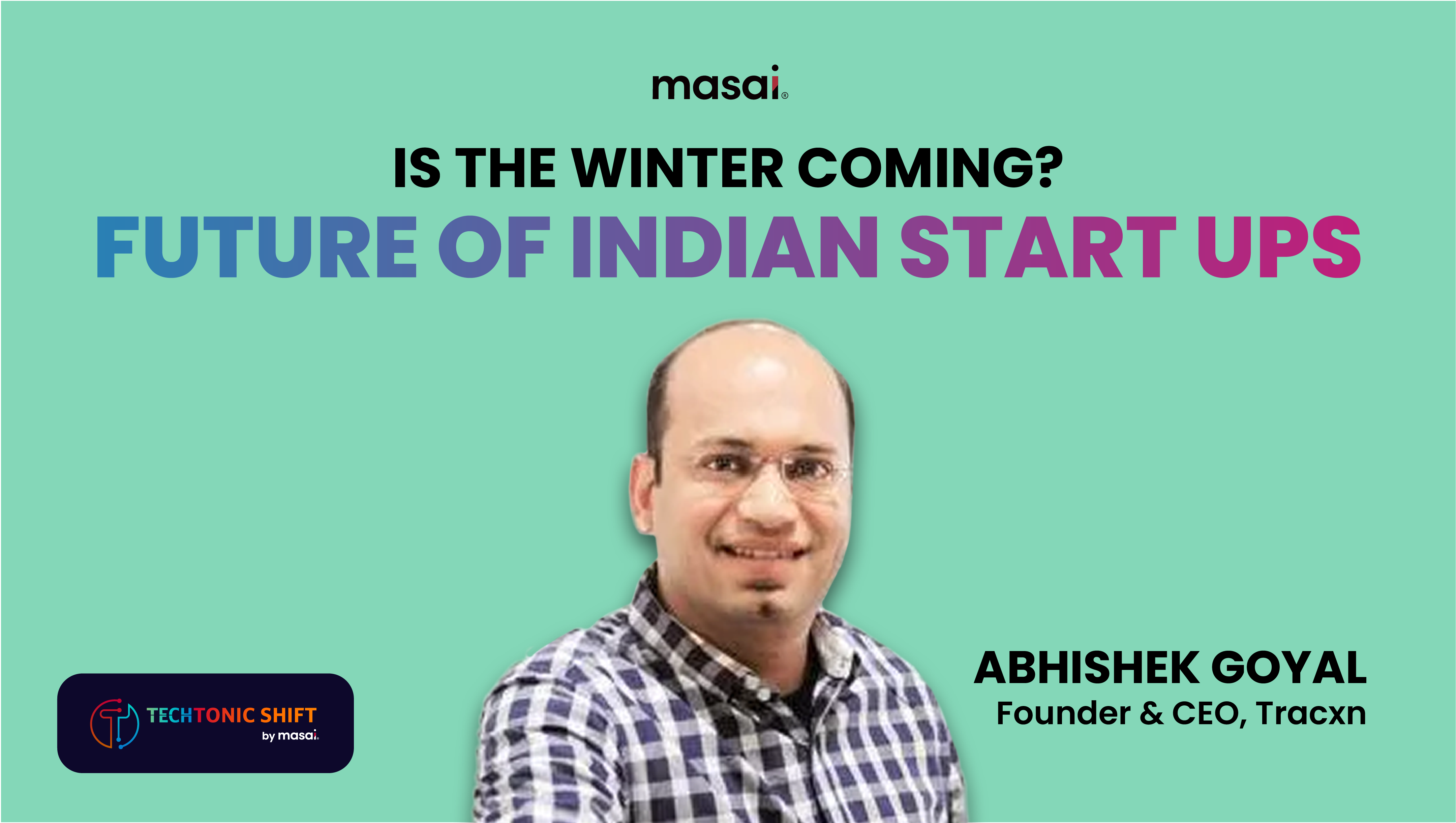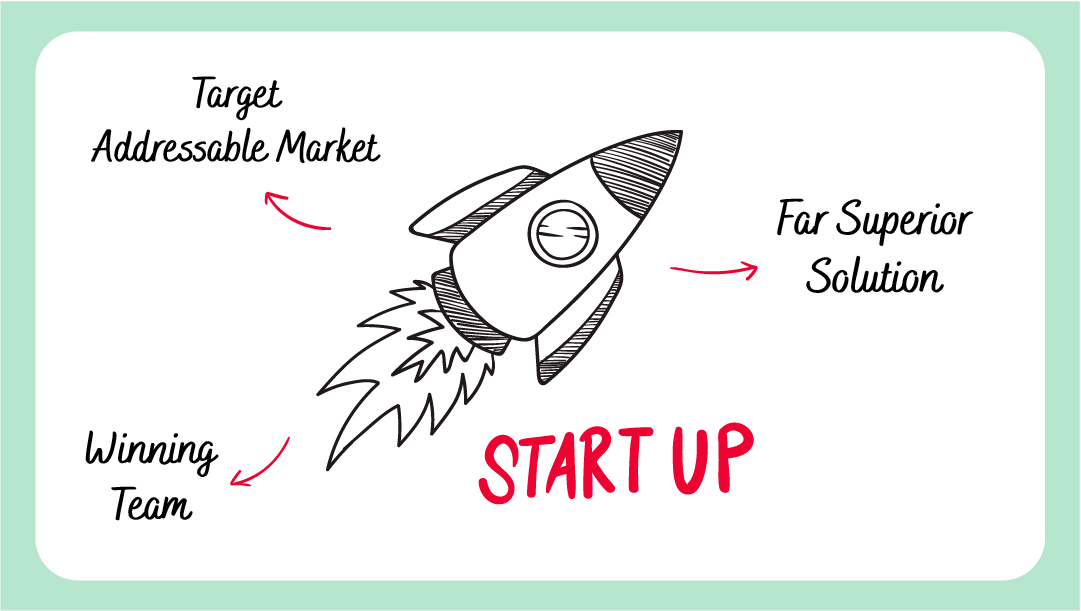Where is the Indian Startup Scene Headed Ft. Abhishek Goyal
"Sunrise industries like EV tech, Health-tech, and Web3 promise enormous growth in the upcoming years and should be among the first choices for freshers."

Our second guest for the day was Abhishek Goyal, who co-founded Tracxn - the World’s largest platform where investors can keep track of the most innovative companies and startups emerging across the globe. The portal has roughly 1.4 million entities categorized across industries, sectors, sub-sectors, geographies, affiliations, and networks.
With angel investments in more than 100 startups - Abhishek is also an investor at Masai, and in this session hosted by Prateek Shukla (Co-founder & CEO, Masai School), he talks about “The future of startups in India”.
This article is bundled with Abhishek's years of experience and wisdom, and we hope reading this helps the readers understand more about emerging markets and opportunities in India.
VC to Entrepreneur - How did that happen?
After completing my B Tech in Computer Science from IIT Kanpur, I went on to work with Yahoo and Amazon in their glory years.
The cumulative experience from working in two surging startups allowed me to better understand the trends of the market. I wanted to use that experience to fund innovative startups, and thus I became a VC.
Startup as a concept was picking up in the US and other countries. People were starting to invest in the internet in India as well.
After having invested in about 100 startups, I realized that I was missing something. I wanted to build a startup myself. And that's when I and Neha decided to start Tracxn in 2013.
What was the idea behind Tracxn?
Investors in public markets have access to a lot of data and software to do the job, but for private markets, there was practically nothing when we started.
For ex- If someone wanted to find Health-tech companies or manufacturing companies, or companies in any other category, and find relevant insights, there was no place for such information.

So we thought if the public market has platforms like Bloomberg or Capital IQ, there is an opportunity to build a data and software platform for private market investors as well. And that’s how we got started with Tracxn.
Over time, we have realized that anybody who cares about tracking innovation is ready to work with us. So, we have several large Fortune 500 companies that track emerging startups on our platform.
What do investors like you look for in a startup?
Large TAM(Targe Addressable Market) - Swiggy for example has a massive TAM, and the fact that people are willing to eat outside, and repeat that habit is a big indicator of Swiggy’s TAM. Measuring the market size in consumer-led businesses is easy, as compared to B-2-B businesses.
Far Superior Solution - Ex - Ordering Food before Zomato was very tough - It was slow and very inefficient, and required the consumer to spend 15 to 20 mins discovering, and contacting the restaurant before placing an order. Food delivery apps made the entire process simpler and faster. People aren’t looking for incremental improvements but mega jumps in user experience and that’s where new startups need to tap in.
Winning Team- Flipkart could have been run by anyone, but it was the team of Sachin and Binny Bansal that made Flipkart what it is today. A winning team in Netflix will be one where the team has a good understanding of technology and content. Putting together a team in which every member can contribute with the skills they’ve mastered, is a huge indicator of future success.

“A jack of all trades won’t do, you need masters of each trade”
Timing - Investors want to know why today, and not 5 years later, or 5 years earlier? Food delivery as a concept wouldn’t have been possible a decade ago when access to smartphones and a good internet connection was limited. It is possible today because of the infrastructure that supports it.
What were the key learnings from the tech journey that helped you in becoming a VC and an entrepreneur?
Both my stints were very special as they came at a time when there were a lot of shifts happening.
- During 2002-2003 when I was working at Yahoo, they tried to buy Google twice but failed. And I saw the tables turn - just because something is large today, doesn't mean it's going to be that way in the long run. I learned the concept of profit pools at that time. However big of hype there is around the company, if there is no profit pool it wouldn’t grow.
- While I was working for Amazon in 2006, they had newly launched AWS - EC2. Back then, they were publicly thrashed for the idea. But now AWS is the biggest revenue generator for Amazon. From here I learned that even great ideas can be misunderstood in the short run, but if the company is focused on delivering value to its customers, then it will succeed.
If you see a shift happening in the tech industry, companies leading that shift can achieve enormous growth.
How can freshers identify the right company to start their career with?
Profit Pool - As I mentioned earlier, look at the profit pool of the company. Ask current employees about the business model, what’s the value per transaction, what’s the average weight of consumption, etc.
Is it a long-term sector? - Measure the winning probability of the sector that the company’s in. Is it an emerging market or is it going to fade in the long run? For ex- Global SaaS market is a huge place for growth at the moment.
Similarly, Sunrise industries like EV tech, Health-tech, and Web3 promise enormous growth in the upcoming years and should be among the first choices for freshers.
Where should a fresher start- An MNC or a Startup?

People should spend most of their professional careers in startups as they'll learn peripheral skills and experience wholesome growth. Startups teach you to think in an outcome-oriented manner.
However, working 2-3 years in a well-run MNC like Apple or Google will also be impactful for your career.
How should students from tier 2, and tier 3 cities with less exposure decide their career path?
Leverage your network - Look into your network, and reach out to anyone who’s doing work that interests you or intrigues you. Meet them, talk to them about their work, and try to understand what they do, how they do it, what are the new things coming up in the market, and just this simple activity will get you a lot of exposure.
Learn to use the internet well - Be curious about things happening around you, and learn how to shuffle between things, how to research, how to find information, and with all this, you’ll soon learn how to generate insights. Follow startup stories, and tech news, and connect with people on LinkedIn. These things will go a long way in building your career.
What’s the scope of tech and data analytics in the next 10 years?
Broadly speaking, tech continues to be a sector where demand keeps outgrowing the supply. That's why we're seeing such massive salary hikes today.
This might change in 20 years. Either we'll have more efficient tech that needs lesser human capital or things like ‘Artificial Intelligence’ and 'No Code' will emerge.
But for the next 10 years, demand for tech and data will continue to outstrip the human supplies and startups will continue to be the top employers for techies.
What sectors do you think are going to have a bright future?
The Edutech sector was being deemed as the next big thing since the early 2000s and finally, Byju's tapped into the market and showed that distribution can be as profitable as the product. So, there’s a lot of space for growth in the Education sector.
I believe Global SaaS is a pretty big market too. India was known to only produce good service-based companies and not product-based companies.
But now, companies like Postman are raising the bar globally.
Fintech is another sector that has been winning in the Indian market and has a bright future.
Towards the end of the segment, Prateek talks about the importance of having role models in one’s life. Abhishek agrees and names two personalities that have inspired his journey- Jeff Bezos and Warren Buffet.
“Jeff’s leadership style is about bringing efficiency and making processes better. This one trait has shaped Amazon’s culture to bring out the best.”
“Warren Buffet has been a master at playing the long game. Buffet visualizes 20-30 years ahead, and the ability to plan for such long shows how deep he dives into his work.” - Abhishek adds.
And we couldn’t agree more. After all, learning from the best brings out the best in you.

